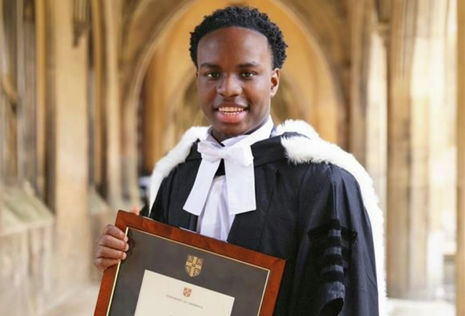Editing the narrative: a black creator’s Cambridge experience
Indya Mason speaks to architecture graduate Dami Fadun about navigating black identity as a Cambridge student

Since March 2023, Dami Fadun has been uploading YouTube videos sharing his experience as an architecture student at the University of Cambridge. His videos once followed his first days as a student, finding his way around the city, late night library sessions, and sporting successes. Now, they document his next steps as the founder of a clothing brand, beginning an internship at Zaha Hadid Architects, and most recently meeting King Charles. In our conversation, he reflects on his journey from Glasgow to Cambridge, his approach to storytelling online, and the added pressures that come with being a black student in a historically exclusive institution. He speaks candidly about the expectations of representation and the balance between showing his own truth and resisting the weight of speaking for an entire community.
What inspired you to set your sights on Cambridge, and did you always believe it was within reach?
I’m from Glasgow, Scotland but I decided to take a chance and apply for a “wild card” uni outside of Scotland. Cambridge was even more of a “wild card” because universities in Scotland would have been free to me. I didn’t necessarily go into secondary school thinking I was going to apply and go to Cambridge. I was only one of two people to apply to Oxbridge; it wasn’t really something that people did where I’m from.
Which experiences do you feel built the groundwork for your academic achievements?
I think my family and community definitely supported this by instilling positive values; African values of community, and Christian values of love and respect. From an academic point of view, that was more internal: I’m self-motivated. My family and I moved to Glasgow from Lagos when I was seven, and I recognised that I had access to a more privileged position, academically speaking. Because of that, I didn’t need a lot of external motivation to study.
How did you navigate the shift in culture, identity, and language after migrating to Scotland?
It was definitely a very long process of assimilation into Scottish culture. The Scottish accent was really difficult to understand at first! It was tough, you know, there were challenges: people would make fun of my accent, and things like that. It got easier. I’m glad to have been raised in Scotland, for sure. Now, it’s something I enjoy being able to share with people.
“I really wanted to show people my authentic journey. We’re all constantly figuring it out, you know?”
When did you start making content on YouTube?
I started that at Cambridge. I was doing TikTok regularly before I came to university, so I was already in the content creation space. I watched a lot of “Cambridge University” videos before university, and noticed that there wasn’t a lot of diversity represented. There weren’t a lot of black creators making videos in Cambridge and I felt like there was a gap in the market for me to jump into! I made my first video at the end of Lent term in my first year.
What aspects of the experience of being a student at Cambridge did you hope to show?
I like to show every single facet of myself, whether that’s university life, football, designing, clothes, or architecture. I really wanted to show people my authentic journey. We’re all constantly figuring it out, you know? It’s not as clean-cut as it may seem from an outsider’s perspective. In some of my videos I show time lapses of me pulling all-nighters and doing work and in others I’m out enjoying myself. It’s all about balance and I wanted to bring people inside of that process.
How do you decide what to share and what to keep private?
I like to be very transparent. I remember when I was in the midst of my internship search, I made a full vlog showing me going to an interview, and then I vlogged about me not getting the job. I take a lot of Ls, day in, day out, I just have to keep going. I like to be very transparent and vulnerable.
“I take a lot of Ls, day in, day out, I just have to keep going. I like to be very transparent and vulnerable.”
How did filming your journey at Cambridge affect the way you reflected on your time here?
Anyone that’s ever edited videos knows it can take ages, so you can easily rewatch your video several times, and at many different parts, while you’re working towards the final product. I feel like that’s definitely allowed me to reflect more on my time here. Typically, I would film content, edit the videos, and upload them about two weeks later. Because of this I’d constantly look back at these experiences and it would hit me all over again; “Whoa. I’m really at Cambridge”.
In navigating Cambridge as a Black student, did you ever feel pressure to represent more than just yourself?
There were four black architecture students in my cohort when I started and that went down to three. There definitely was a pressure. I felt as if at least one of us had to be in the top three. If we didn’t do well, it meant that all Black people were less capable. That’s what it felt like, at least. In terms of university sports, I really felt that I had to push back against the stereotype that black people often meet the physical requirements but don’t possess technical, or tactical thinking skills. You’re fast, strong, you can jump high, whatever. But you’re not smart on the pitch. So I felt a pressure to disprove that and show that black players are just as intelligent.
Does the responsibility of representing black students follow you into the content creation space?
I post quite freely. I always make sure to get diverse voices on my page. I try to make it as clear as possible that although this is my channel and I’m sharing my time here, my individual experience is one among many. Like, this is just me; it’s not universal. And all black people are different, of course. I couldn’t possibly represent every single version of blackness.

Robert Webb is back, not bitter
 News / Judge Business School advisor resigns over Epstein and Andrew links18 February 2026
News / Judge Business School advisor resigns over Epstein and Andrew links18 February 2026 News / Gov grants £36m to Cambridge supercomputer17 February 2026
News / Gov grants £36m to Cambridge supercomputer17 February 2026 News / Hundreds of Cambridge academics demand vote on fate of vet course20 February 2026
News / Hundreds of Cambridge academics demand vote on fate of vet course20 February 2026 News / CUCA members attend Reform rally in London20 February 2026
News / CUCA members attend Reform rally in London20 February 2026 News / Union speakers condemn ‘hateful’ Katie Hopkins speech14 February 2026
News / Union speakers condemn ‘hateful’ Katie Hopkins speech14 February 2026









